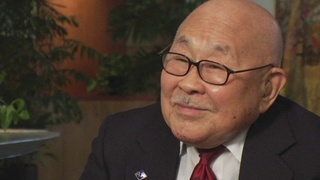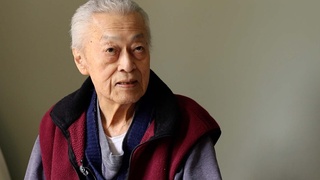Interviews
Challenges of finding a summer job
I want you to know, first of all, being outside was not easy. As long as I was on the campus, things were fine. When summer vacation came, it was time for me to get out and do some work and earn some money.
So Tom and I went up to Milwaukee, Wisconsin, and I could not get jobs. Incidentally, I want to back up and tell you that at Dakota Wesleyan, in the evening, when I was in Mitchell, South Dakota, I attended a course on welding at some school, and I learned how to weld. And the reason I learned arc welding is that, in my spring vacation, I wanted to go out and get a job as a welder, which brings me up to Milwaukee, Wisconsin.
I went up there, Tom and I, and there’s a company up there by the name of Harnischfeger. It’s still there. They were building tanks and so forth—military equipment. They gave me a test for welding, and I passed because I had trained in that. But when they heard that I was a Japanese, when the personnel manager found that out, they refused to hire me.
Date: August 27, 1998
Location: Pennsylvania, US
Interviewer: Darcie Iki, Mitchell Maki
Contributed by: Watase Media Arts Center, Japanese American National Museum
Explore More Videos

Influence of Mexican culture after returning from camp
(b. 1943) Japanese American transgender attorney

A conversation with a farmer in Kansas
(b. 1939) Japanese American painter, printmaker & professor

Dancing in Japan as an American, in the US as Japanese
(1918-2023) Nisei Japanese kabuki dancer

Discrimination in San Francisco
(1914–2015) Nisei YMCA and Japanese American community leader

Collection of artifacts depicting racial stereotypes influences art
(b. 1939) Japanese American painter, printmaker & professor

Encountering racial discrimination at a public swimming pool
(b. 1923) Nisei from Washington. Resisted draft during WWII.

His testimony has more credibility because of his race
(1922 - 2005) Former U.S. Army counterintelligence officer

Gender discrimination in education field
(1925 - 2018) Nisei educator from Hawai‘i

Learned what it meant to be called “Jap” in Heart Mountain
(1934–2018) Japanese American designer, educator, and pioneer of media technologies

First impression of New York City during war time
(1915 - 2011) Nisei florist who resettled in New York City after WW II. Active in Japanese American civil rights movement

The day Pearl Harbor was bombed
(1922–2014) Political and civil rights activist.

Not bringing shame to family
(1926 - 2012) Scholar and professor of anthropology. Leader in the establishment of ethnic studies as an academic discipline

Past ties to present situation in Middle East
(1926 - 2012) Scholar and professor of anthropology. Leader in the establishment of ethnic studies as an academic discipline

Didn't have rights that whites had
(1922–2014) Political and civil rights activist.

Californians didn't know about evacuation
(1922–2014) Political and civil rights activist.
